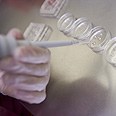New regulations allow women to freeze eggs without medical justification; demand for procedure is rising in spite of doctors’ hesitation
The fertility revolution has reached Israel: Hundreds of Israeli women wishing to preserve their chances of having children later in life have chosen to freeze their eggs over the past year, and demand for the procedure is growing rapidly.

Fertility Treatments - Photo: Shutterstock
The Ministry of Health approved a policy in September of 2010 that permits women to freeze their eggs for reasons other than medical ones. Previously, the process was only allowed in cases involving illness, for example cancer, which requires aggressive treatment. But due to the fact that women’s fertility starts to decline as early as in their twenties, more and more women want to preserve their chances of successful pregnancy at an older age.
Innovative procedures allow women to freeze their eggs, and to fertilize them at a later date, thus maintaining their chances of having kids in the future.
According to the Health Ministry’s new guidelines, egg freezing is permitted for all women aged 30-41, and the utilization of the eggs is permitted until the age of 54. Every woman is allowed to have four extraction sessions, each harvesting up to 20 eggs. The procedure is performed in private clinics and costs thousands of shekels.
New data published in the Assuta Medical Center’s online magazine shows that hundreds of women chose to freeze their eggs as insurance in the past year. More than 100 women were treated in the Assuta clinics in Tel Aviv and in Rishon Lezion. However, only 20 women underwent the process at the Sheba Medical Center in Tel Hashomer – perhaps due to IVF Unit Director Professor Shuki Dor’s lack of enthusiasm for the procedure.
“When a patient asks me to freeze her eggs, I don’t automatically agree, but explain to her the meaning of the procedure, and what are the implications,” Dor said.
Waiting for a Husband
In Shaare Zedek Medical Center in Jerusalem, 30 women have frozen their eggs, most of them religious, and demand for the procedure is rising steadily. “Every day we receive new requests,” said Professor Ehud Margalit, head of the IVF Unit at the hospital. “We try to convince them not to freeze their eggs but to use a donor’s sperm to conceive now, and not to trust fertility in the future. Still, most women wait for a husband.”
Women cannot see the procedure as a guarantee for future pregnancy, according to Professor Arik Kahana, head of the Fertility Unit at the Assuta Medical Center in Rishon Lezion. Kahana explained that although women feel young, their ovaries are not. After a certain age, the chances for successful pregnancy are slim. “We don’t want to give women a false sense of security,” he said.
View Source
By Sarit Rosenblum







 Israeli New Shekel Exchange Rate
Israeli New Shekel Exchange Rate